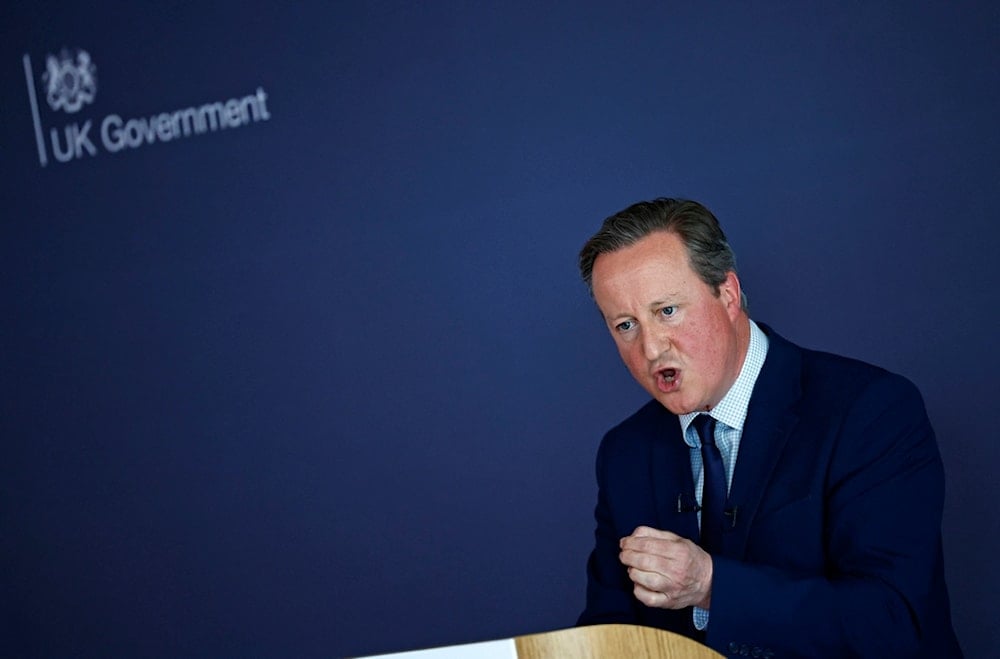Cameron defends UK arms sales to 'Israel', Labour MP cites war crimes
UK Foreign Secretary David Cameron defends continued arms sales to "Israel" despite US halts and criticism from Labour MP Zarah Sultana, who accuses the government of abetting war crimes.
-

Britain's Foreign Secretary David Cameron delivers a speech at the National Cyber Security Centre in London, on Thursday, May 9, 2024. (AP)
UK Foreign Secretary David Cameron stated on the BBC that while he opposes a major ground offensive in Rafah, the UK will not follow in the US footsteps in halting some arms sales to "Israel". He noted that the UK contributes only 1% to "Israel's" total weapons supply and emphasized that "Israel" needs to better "protect civilians" and ensure the passage of humanitarian aid.
Meanwhile, Labour's Jonathan Ashworth, among others, expressed opposition to the use of UK-made arms in Rafah.
This week, US President Joe Biden announced that the US would halt weapon supplies to "Israel" if it proceeds with its planned invasion of Rafah without setting a US-approved plan to allegedly protect Palestinians; despite the clear disregard for Palestinian life as the confirmed death toll surpasses 35,000 people.
In response, Israeli occupation Prime Minister Benjamin Netanyahu stated that Tel Aviv is willing to stand alone if it needs to.
According to Cameron, the last time he was pressured to halt weapons sales to "Israel" was after the Israeli occupation forces killed three UK citizens in a strike on their car, making reference to the deliberate targeting of the World Central Kitchen workers in Gaza earlier in the war.
However, Cameron then added that "a few days later there was a brutal attack by Iran on Israel," making reference to Iran's retaliation to "Israel's" bombardment of the Iranian consulate in Damascus, Syria, which left several martyred.
Subsequently, Cameron emphasized that "just to simply announce today that we will change our approach on arms exports, it would make Hamas stronger and it would make a hostage deal less likely."
Meanwhile, he expressed a commitment to "hammering away every day" to ensure that humanitarian aid reaches Gaza, with nothing done on the ground in this regard.
The Foreign Secretary then acknowledged "Israel's" actions, admitted that "Israel's performance is not good enough," and noted that "Israel has not had a clean bill of health" in terms of facilitating humanitarian aid access in the genocide-stricken and besieged Gaza Strip.
However, Cameron once more reaffirmed the UK's policy vis-à-vis the occupation and said that the UK maintains "a different approach" and that he was "not really interested in message sending" through political moves like suspending weapons sales to Tel Aviv.
He explained, "I'm interested in what can we do to maximize the British pressure and the outcome that will help people in their lives - including getting the hostages, including British nationals, released."
Additionally, he rejected the notion of deploying British troops to Gaza, asserting that it was "a risk that we should not take."
Contradictions within the UK
In a pointed criticism of the UK government, Labour MP Zarah Sultana accused the administration of failing to adhere to its own Strategic Export Licensing Criteria by supplying weapons to "Israel". Speaking to the BBC, Sultana argued that the scale of the arms sales is inconsequential when such weapons could potentially be used in violations of international humanitarian law.
"We are aiding and abetting what are war crimes happening on a daily basis," she stated, underlining the serious nature of the ongoing genocide.
Additionally, Jonathan Ashworth, a senior member of the shadow cabinet, expressed his concerns about the potential use of British-made weapons in a proposed full-scale offensive into Rafah, describing such a scenario as a "catastrophe beyond description."
As such, Ashworth emphasized he did not "want to see British-made weapons used" in an invasion in Rafah.
Read more: UK executed 200 spy missions over Gaza to assist 'Israel' in genocide

 4 Min Read
4 Min Read








